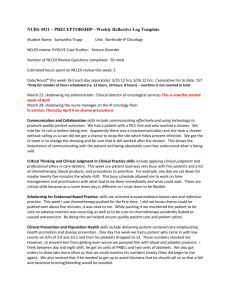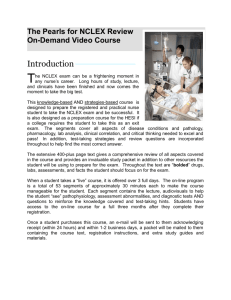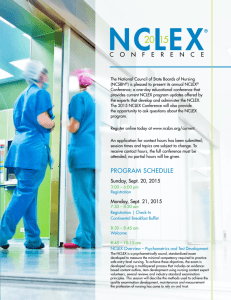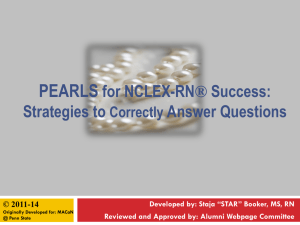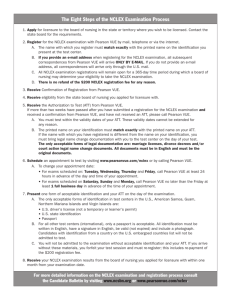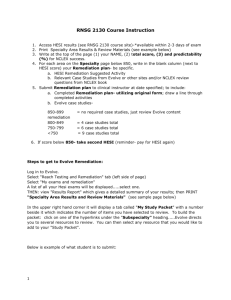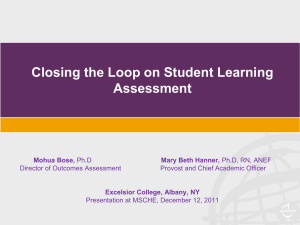Taking the NCLEX exam â
advertisement
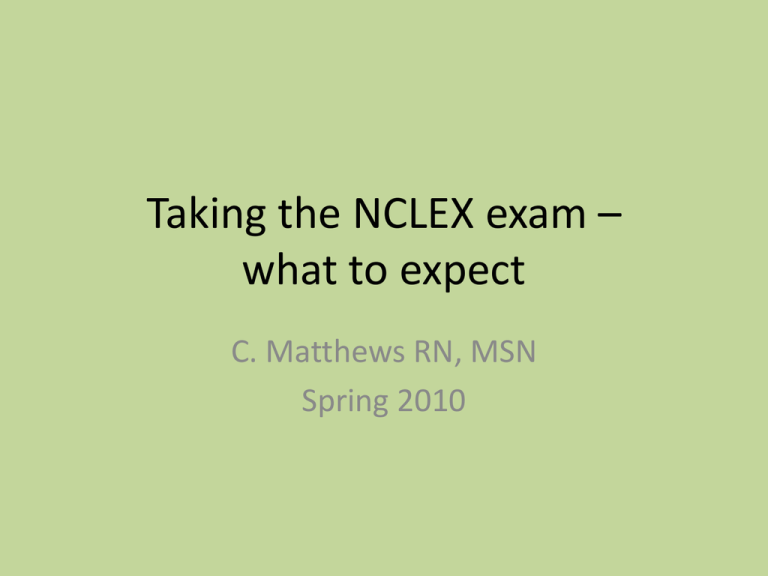
Taking the NCLEX exam – what to expect C. Matthews RN, MSN Spring 2010 • “While many nursing students and new grads experience anxiety over the NCLEX, around 70% pass the RN exam the first time…” (p.14). » Gaskill, M. (2008). “Who writes the NCLEX?” p 14-15. Fall 2008 Future Nurse www.nurse.com • Remember… 94.74% of our 2009 graduates passed on the first try…so LSCC has a much higher pass rate than mentioned above! What is the NCLEX process? Go to the hot link provided below…go toward the bottom of the page and click where is says “The NCLEX process: Click here.” (or, just click here!) This provides a detailed explanation of how the NCLEX is developed, used and scored. https://www.ncsbn.org/nclex.htm How to begin: • https://www.ncsbn.org/nclex.htm • Go to the link above – there you will find a great deal of information re: how to register, what to expect on the day of the exam, the test plan, etc. PREPARE! • Don’t wait until you graduate to prepare! • Prepare all along… • do hundreds and hundreds of NCLEX questions during nursing program. • Don’t count on just our theory exams and HESI exams to give you enough experience with these types of questions…go to other sources as well. – Gaskill, M. (2008). “Who writes the NCLEX?” p 14-15. Fall 2008 Future Nurse www.nurse.com Prepare • Obtain a copy of the test plan on the NCSBN website https://www.ncsbn.org/1287.htm • Put your syllabi next to the test plan…see any connections? PREPARE! • “The take home message for nursing students is study early and study often for the NCLEX.” Gaskill, M. (2008). “Who writes the NCLEX?” p 15. Fall 2008 Future Nurse. www.nurse.com Registration • https://www.ncsbn.org/1213.htm • • https://www.ncsbn.org/1202.htm The NCLEX test center • http://www.pearsonvue.com/nclex/ • This site (as well as the https://www.ncsbn.org/nclex.htm • Site) will tell you about the test center, the security measures involved, what to bring and so forth. Look for a virtual tour of the center. NCLEX is a ‘CAT’ • Computer adaptive test – the computer calculates a candidate’s ability based on the individual’s responses to items, and then it searches for an item that matches it to show next. NCLEX is a ‘CAT’ • ““Item difficulty changes depending on your answers. Everybody starts with an easy question, and if you don’t answer that, you’re given another easy one. If you do answer it, then you get a moderate question, and if you answer that, a hard one. At some point, it becomes clear you are going to pass or not, and the test stops. It’s a myth that if the test stops at 75 questions, it means you’ve passed, because it can go both ways.” • Gaskill, M. (2008). “Who writes the NCLEX?” p 15. Fall 2008 Future Nurse. www.nurse.com NCLEX is a ‘CAT’ • Exam results are based not on the number or percentage of items answered correctly, but the difficulty of the items that a candidate can answer correctly 50% of the time. • Passing candidates answer 50% of the more difficult items correctly, and failing candidates answer 50% of the easier items correctly. NCLEX is a ‘CAT’ • Tailored to the person taking it • High ability gets high level questions • Variable length • 2009 NCLEX Invitational updates NCLEX is a ‘CAT’ • If the results of your answers show you are clearly above or below passing standard, the exam will end. • If you are close to line (it is not clear if you are definitely above or below passing) more and more questions fired! • No random maximum length test (265 items) – 2009 NCLEX Invitational updates NCLEX is a ‘CAT’ • “The computer continues to give you questions until it comes to a statistically valid number. Many will pass or fail after answering the minimum 75 questions while others may be required to complete the 265 maximum.” “Flying Colors” Hugg, A. 2004 Future Nurse www.nurseweek.com What happens during the test… • Test items use revised Bloom’s taxonomy (verb form) – you should be able to: • • • • • • Remember Understand Apply-knowledge applied to situation Analyze-how are parts related Evaluate-making judgment based on information Create-putting elements together to make functional whole What happens during the test… • All items are pretested. Statistical criteria is used to determine difficulty, etc • There are experimental questions on each exam (15) – these won’t count against your score. While taking the test… • Read carefully and take plenty of time on the test • Read the question 2 -3 times to make certain you understand the question. • Don’t get in a hurry to answer. “Alternate” questions • https://www.ncsbn.org/Alternate_Item_Form ats_FAQ.pdf Sites of interest • http://www.allnursingschools.com/faqs/nclex. php • http://www.cybernurse.com/nclex.html • http://www.associatedcontent.com/article/17 99950/how_to_register_to_take_the_nclex_e xam.html • http://www.nclexguides.com/nclex-exam.php • http://www.nclexinfo.com/

